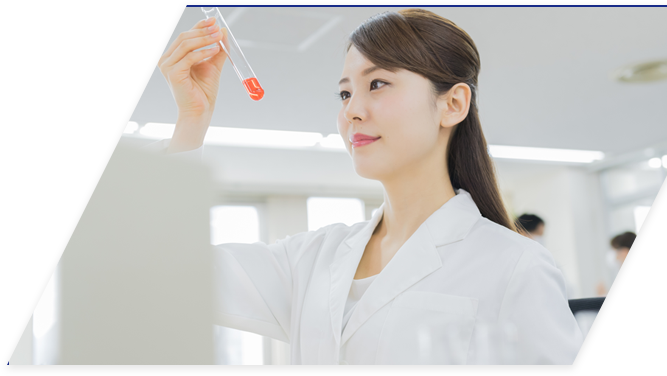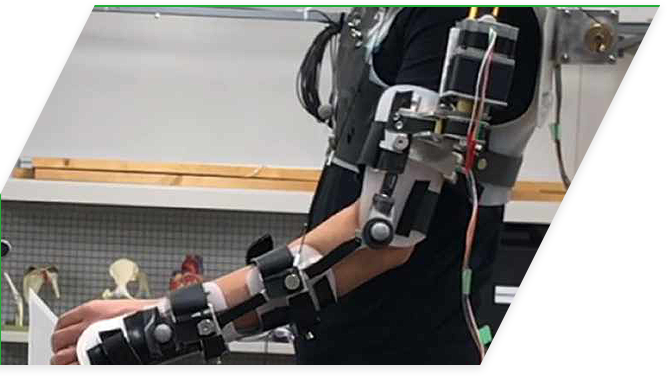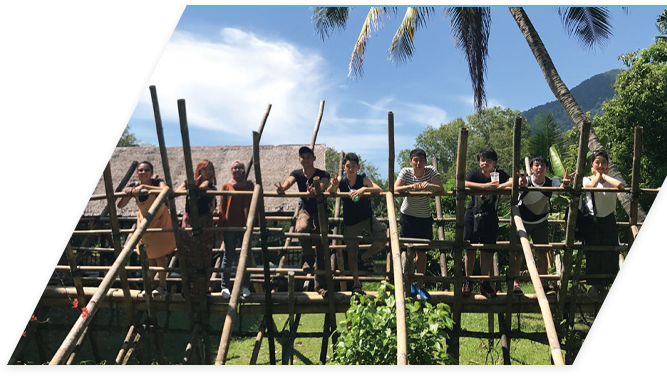学科紹介 Introduction
生命科学科では、生命現象の解明と医療福祉技術の開発を通して、健康寿命の延伸と活気あふれる社会の実現を目指します。
The Department of Bioscience & Engineering aims at realization of extending healthy life expectancy and vigorous society through investigation of biological phenomena and development of medical and welfare technologies.
2015年9月の国連サミットにおいて、持続可能な世界を実現するための国際目標「SDGs(Sustainable Development Goals:持続可能な開発目標)」が採択されました。生命科学科は、SDGsの目標3「あらゆる年齢のすべての人々の健康的な生活を確保し、福祉を促進する」の達成に向け、生命現象の科学的解明および健康の回復や促進、生活支援を実現する新しい技術の開発に取り組んでいます。主に生命現象の解明を目指す生命科学コースと、主に医療福祉技術の開発を目指す生命医工学コースの両コースにおいて、生命科学の基礎から応用にいたるまで有機的に構成された教育を行っている点が特長です。
Sustainable Development Goals (SDGs), global goals for a sustainable world, were adopted at the UN summit in September 2015. The Department of Bioscience & Engineering is working on the development of new technologies to scientifically elucidate biological phenomena, as well as to restore and promote health and support people’s lives. These are all in order to achieve the third goal of SDGs (SDG 3), which is to “Ensure healthy lives and promote well-being for all at all ages.” The Bioscience Course, which mainly focuses on the elucidation of biological phenomena, and the Biomedical Engineering Course, which mainly focuses on the development of medical and welfare technologies, both uniquely provide organically structured education covering both basic and applied life sciences.
生命科学コース
Bioscience Course
生理学、生化学、有機化学をベースに老化という生物にとって避けられない現象を科学的に解明するとともに、環境化学、栄養学、バイオテクノロジーなどについても詳しく学びます。
Based on physiology, biochemistry, and organic chemistry, we chemically elucidate the inevitable phenomenon of aging, while study in-depth about environmental chemistry, nutrition, and biotechnology
研究テーマResearch Theme
「老化」をキーワードに、生命のメカニズムを解明する幅広い研究に取り組んでいます。生化学、応用微生物学、食品栄養学、医薬品合成化学、分子細胞生物学、環境化学、毒性学などの分野の研究を行います。
The Bioscience Course is working on a wide range of research to elucidate biological mechanisms, centered around the keyword “aging.” We are conducting research into the fields of biochemistry, applied microbiology, food nutrition, pharmaceutical synthetic chemistry, molecular and cell biology, environmental chemistry and toxicology.

生命医工学コース
Biomedical Engineering Course
工学的手法による生命現象の解明とその知識の医療技術への応用を目指しています。メカトロニクスやバイオメカニクスをベースに人工臓器や医療福祉ロボット、福祉リハビリテーション機器など生命・生体機能を維持・回復させる装置や、より人に優しく使いやすい製品の設計について学びます。
We aim to elucidate life phenomena by engineering techniques and apply the knowledge to medical technology. Based on mechatronics and biomechanics, you will learn about artificial organs, medical welfare robots, welfare rehabilitation equipment, and other devices that maintain and restore life and biological functions, as well as designing human-friendly and easy-to-use products.
研究テーマResearch Theme
医療・福祉ロボットシステム、福祉機器、リハビリテーション機器、再生医療、バイオ流体科学、人工臓器、脳機能計測、バイオメカニクスなどの研究に取り組んでいます。
The Biomedical Engineering Course is performing research into topics such as medical welfare robot systems, welfare devices, rehabilitation devices, regenerative medicine, biofluid Science and Engineering, artificial organs, brain function measurements and biomechanics.

国際プログラム
Global Program
国境を越えてグローバルに活躍できる理工系人材の育成を目指します。
幅広い理工学知識と語学力とコミュニケーション能力を持ち合わせ、 他分野・異文化と相互理解・交流し、高い倫理観で行動する力を養成します。 3年次に1セメスター以上海外提携大学に留学して、規定数以上の単位を修得するのが特徴です。国際研修科目、4年次の総合研究(卒業研究)を英語で執筆、発表するなど、卒業に必要な総単位数の1/4以上を英語開講科目で学修します。 入学後に国際プログラムの希望者を募り、選抜を行います。
We aim to develop graduates of science and engineering who can work globally across borders.
You will acquire a broad science and engineering knowledge, language skills and communication skills. You will also learn to mutually understand and interact with people in other fields and other cultures, as well as develop the ability to act in accordance with high ethical standards. This program is unique, as you will be required to study abroad at partner university for 1 semester or more during your 3rd year to obtain specified number of credits. 1/4 of total credits that are required for graduation must be obtained from subjects conducted in English, such as international training program. You are also required to write and present your final year research thesis in English. Selection for the Global Program will be conducted after admission to the department .

